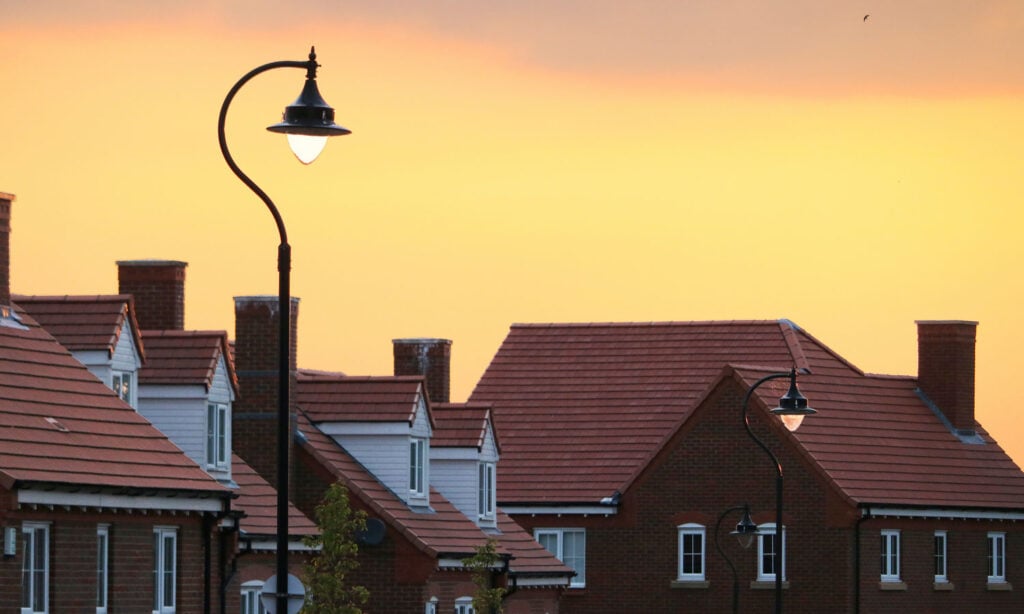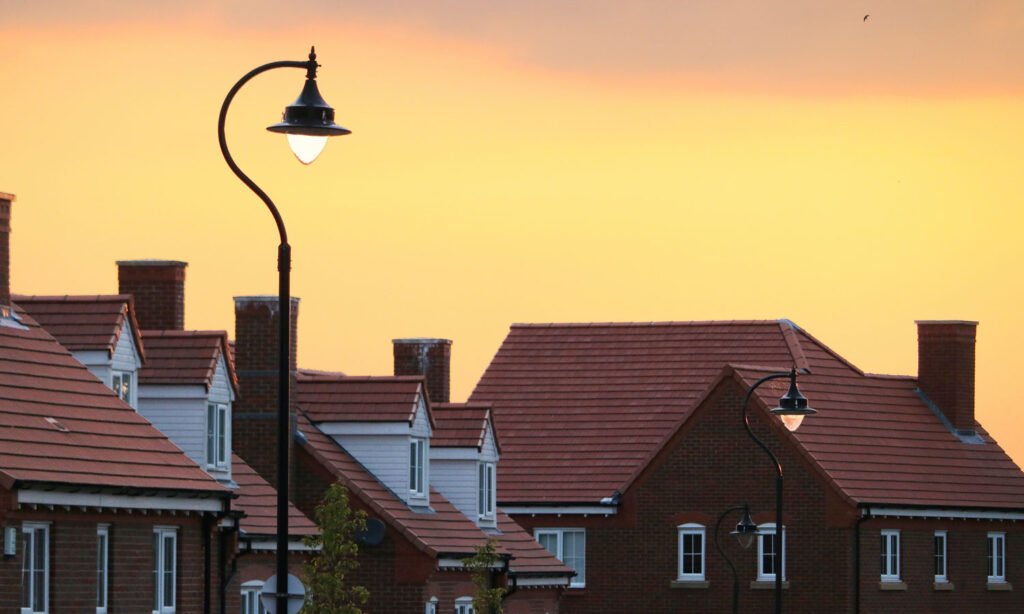Usually it’s a choice between term life insurance and whole life insurance. But where does mortgage insurance come into play? We talked to an expert to find out when it’s needed.

Photo by Tom Thain on Unsplash
Life insurance can be a necessity for ensuring your loved ones are taken care of after you’re gone. It can help them pay for funeral expenses, the costs of everyday living and much more. But one of life insurance’s main advantages is that it can pay off outstanding debts, including a mortgage. So, life insurance vs. mortgage insurance? Which is better?
Get personalized quotes from Canada’s top life insurance providers.All for free with ratehub.ca. Let’s get started.*
This will open a new tab. Just close the tab to return to MoneySense.
How do mortgages work?
First, a mortgage is the debt you owe when you can’t pay the full price of a home or other property—it’s the difference between what you offer as a down payment and the purchase price. Usually, lending institutions advance the difference to the seller, who then receives the full sale price upon closing of the deal. Then you sit down with the lender to work out your repayment terms.
What is life insurance?
An individually owned life insurance policy provides tax-free money following the death of the insured. It can be used to pay off your mortgage, either in whole or in part.
“Life insurance may completely pay off this obligation if the borrower passes away while there’s still an outstanding balance,” says Peter Wouters, director of tax, retirement and estate planning services at Empire Life Insurance Company in Burlington, Ont. “Your family may otherwise not be able to afford the mortgage payments or be able to stay in the family home.” Any extra amount left over may be used by the beneficiaries of your choice for other needs. (Our guide to finding the best life insurance in Canada.)
“You may consider critical illness coverage to cover your mortgage as well,” he adds. “Disability insurance tied to mortgage insurance may cover a couple of years’ worth of mortgage payments, giving you and your family breathing time to decide what to do longer term.”
Get personalized quotes from Canada’s top life insurance providers.All for free with ratehub.ca. Let’s get started.*
This will open a new tab. Just close the tab to return to MoneySense.
So, what is mortgage insurance?
Mortgage protection insurance through a mortgage lender gives you coverage the same way life insurance would, but only for your mortgage debt. “The lender owns the coverage and you pay for it,” explains Wouters, “so the lender gets the insurance proceeds when you die.”
Mortgage insurance may be necessary in certain financial situations. For example, you may have to purchase it from the Canada Mortgage and Housing Corporation (CMHC) depending on the amount of your down payment. “If you buy a home with a down payment of less than 20%, you’ll have to pay for mortgage loan insurance,” says Wouters. “This type of default insurance protects your lender in case you can’t make your payments.”
Mortgage insurance vs. life insurance
How does mortgage protection insurance compare to life insurance? We break it down here. The first thing you’ll notice, though, is that mortgage insurance protects the lender for debt, and life insurance protects the homeowner’s beneficiaries for debt.
|
|
How much mortgage insurance do I need?
The risk you’re covering is the outstanding amount of the mortgage itself, but don’t forget about those home equity loans you took out on top of that.
And a few things to keep in mind: “Females pay less than males; non-smokers and those in good health pay lower rates; and the older you are, the more it’s going to cost, all because the risk of dying increases,” says Wouters.
Is mortgage insurance worth it?
A home is probably the biggest asset you’ll own, and a mortgage is one of the biggest debts you’ll take on in your lifetime to buy it.
“Mortgage debt in Canada stood at almost $1.63 trillion dollars in the third quarter of 2020, according to Statistics Canada,” says Wouters. “Life insurance can pay off the mortgage for pennies on the dollar when a breadwinner dies, and this can save many thousands—perhaps hundreds of thousands of dollars—in interest payments, too.”
You and your family can gain peace of mind in that they can continue to live in your home and in the same neighbourhood you chose with their best interests in mind. If it’s worth it to buy a home, for many it’s worth the additional costs of insurance. Consider what would happen if a critical illness struck or the breadwinner suffered a disability. There’s coverage for that, which can cover the mortgage or mortgage payments for a period of time.
Mortgage default insurance may not be as important if you own a home that has risen substantially in value; in the event of your death, your family could downsize to another home and pay for it in full. “Don’t forget about moving expenses, and legal and registration fees, which can really add up,” says Wouters. “Consider all of these things should a critical illness or disability strike. The needs for cash and cash flow are still there.”
Is life insurance worth it?
Individually owned life insurance tends to be cheaper than mortgage insurance. In some cases, it’s significantly less expensive than mortgage protection insurance from a lender. “The tax-free proceeds can remove a huge financial burden from the shoulders of the family you leave behind,” says Wouters.
Plus, people often have other needs besides paying off a mortgage, like providing income for a surviving spouse, home maintenance, education for your kids—all of which life insurance can cover. “If you have plenty of other assets and investments that wouldn’t trigger any taxes on your death, your spouse is working and earns even more than you do, and your survivor would move to a less-expensive home if you passed away, then having extra life insurance may not be as important,” says Wouters. “A growing number of people in their 60s and 70s have a mortgage and no heirs, or have heirs to whom they don’t want to leave much. The house would be sold on death, and whatever is left after the mortgage and other expenses are covered goes to the heirs. For those people, life insurance may not be as important a consideration when looking at paying off the mortgage.”
Get personalized quotes from Canada’s top life insurance providers.All for free with ratehub.ca. Let’s get started.*
This will open a new tab. Just close the tab to return to MoneySense.
Are coverage and fees affected by what’s left owing on a mortgage?
Mortgage protection insurance through a lending institution like a bank, trust company or credit union typically provides decreasing coverage to match the decreasing outstanding mortgage. However, the cost remains the same. “You are paying the same amount of money for something that is going down in value,” says Wouters. “If a mortgage is renegotiated, renewed or moved to another mortgage provider, you may have to reapply for coverage, and the cost will go up because you’re older and may not be as healthy as you once were.”
Remember that in the early years of your mortgage, most of your mortgage payments go to interest charges. “You’ll need most of the coverage on renewal of the mortgage,” says Wouters. “Your age and health may drive the cost up more than the reduction in the amount of the outstanding mortgage at the time of renewal or change.”
So, what happens with your payout if you die with a small amount left on the mortgage? For example, are you paying premiums on a $500K mortgage for 10 years, and your family is only paid out for what’s left on the mortgage at the time of death?
With mortgage protection insurance offered by a lender, the amount of coverage is about the same as the amount of the outstanding balance of the mortgage. “Your rates, at best, have remained the same while the coverage amount has been dropping regularly,” says Wouters. “With life insurance offered through a life insurance company, your payments remain the same for the length of the term of coverage. The coverage remains the same, too.”
If you name a beneficiary on the life insurance policy, then they pay off whatever is left on the mortgage and keep the rest to pay off other debts, or provide cash for other needs and an income stream.
What to expect when you renew your mortgage
The premium will increase on a cost-per-dollar-of-coverage basis, particularly if you renegotiate or move the mortgage to another provider for a more favourable mortgage rate or better-suited repayment terms. “Consider, as well, that many homeowners don’t stay in the same home for life, so this is a common occurrence,” says Wouters. “The increase in premium may be offset by a reduced mortgage, though the mortgage balance generally drops quite modestly in the first five to 10 years of a typical 25-year mortgage.”
For example, let’s look at someone who starts off with a $500,000 mortgage. Assuming an average 3% interest rate, monthly payments would be $2,366.23. The mortgage term is five years.
|
|
In this example, the amount of mortgage insurance from a commercial lender drops and the cost of coverage stays the same, at best, though each five-year renewal would drive up the cost if the mortgage is renewed, renegotiated, moved to a different mortgage lender, or applies to a different house because you moved. With individual life insurance, the coverage stays the same and so does the cost for the term period you purchased. At renewal, you decide how much life insurance you still need and then pay the rate for that coverage at your older age. No medical evidence or re-qualification is necessary.
Overall, it’s worth determining your unique needs and financial situation before choosing which one is best for you. But some type of coverage is essential if you own a home. As Wouters sums up: “If it’s worth taking on all that debt to buy a home, isn’t it worth paying a comparatively small amount to make sure the debt is paid off when the breadwinner passes away?”



